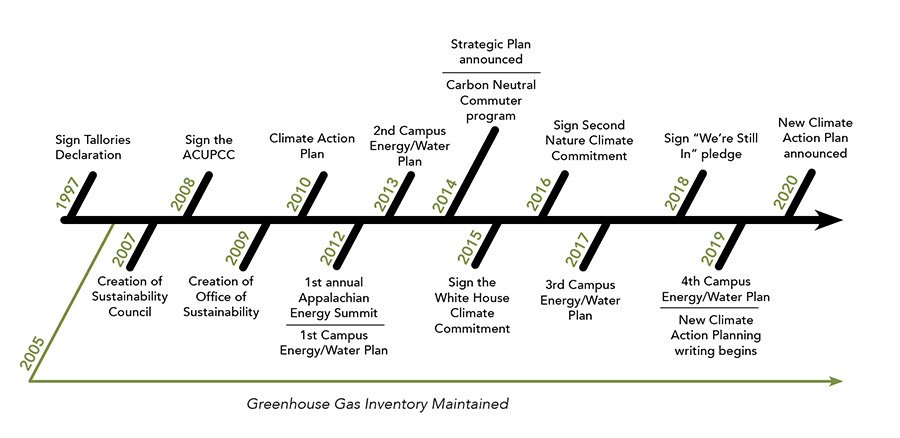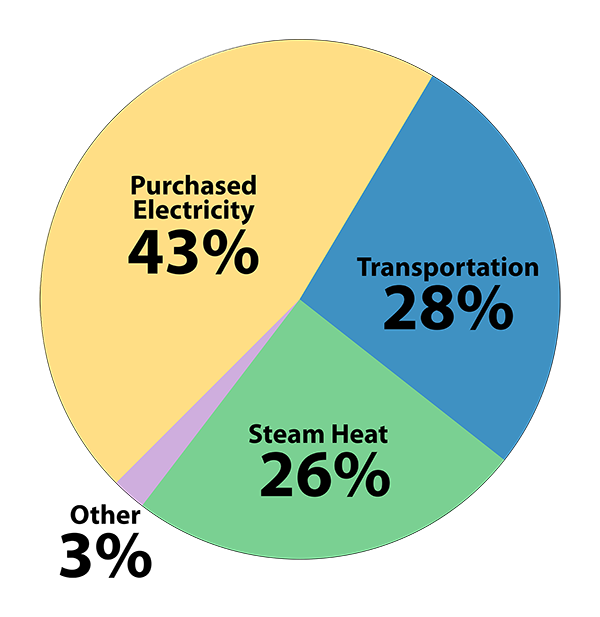BOONE, N.C. — Appalachian State University’s new Climate Action Plan will be released April 22, 2020 — the 50th anniversary of Earth Day.
The plan, authored by Appalachian’s Sustainability Council — comprising faculty, staff and students from across campus — updates initiatives from the original climate neutrality plan written in 2010 (PDF).
Dr. Lee F. Ball, Appalachian’s chief sustainability officer and chair of the council, explained that both the original and the new plan are “living documents,” designed to evolve along with advances in technology and research.
Ball said the first few years of Appalachian’s original climate neutrality plan concentrated on raising awareness and identifying actions to take. “Now we are in the aggressive implementation phase,” he said.
“The UNC System goal is to achieve climate neutrality by 2050," Ball continued. "Our Faculty Senate set a goal of 2035, and our Student Government Association set the goal as 2025. We will hit some targets by 2025. We’ve already made many efficiency improvements. Other elements of the plan will take longer, but our commitment as an institution is solid, rooted in history and tradition, and steadfast.”
The university’s Office of Sustainability acts as a catalyst, Ball said, developing sustainability guidelines and policies, educating the community, measuring and evaluating progress and engaging stakeholders from throughout the Appalachian Community in the planning and implementation of climate action initiatives.
Appalachian stakeholders — including the Office of Sustainability, Facilities Operations, Faculty Senate, Staff Senate and others — are focusing on elements of the Climate Action Plan related to their working groups’ areas of responsibility. The groups will assess the impact of each area as it relates to the carbon footprint of the university and offer mitigation strategies, as well as recommend lower carbon alternatives.
Of Appalachian’s total carbon footprint — the amount of greenhouse gases emitted from use of fossil fuels, contributing to climate change — about 43% is from purchased electricity, 28% is from transportation and 26% is from the generation of steam heat. “Those are the big three,” said Jim Dees, data and assessment specialist in Appalachian’s Office of Sustainability.
Dees said the Climate Action Plan will include recommended mitigations for each of these categories.
Making progress
According to Ball, net emissions for fiscal year 2019 were down 10.5% from the base measurement year of 2009, a time period in which the university’s square footage increased by 14%. Some of the initiatives responsible for the improvements included the following:
- Reprogramming of computer software systems for heating and air conditioning systems.
- LEED certifications on several buildings.
- Appalachian’s Strategic Water and Energy Management Plan (PDF).
Appalachian has been recognized and awarded for sustainability and climate actions, including the following:
- A pilot and charter participant in the Sustainability Tracking, Assessment & Rating System™ (STARS), achieving a prestigious Gold rating for each of the three measurement periods.
- Bee Campus USA, recognizing Appalachian’s focus on providing safe habitats for pollinators and education about the pivotal role bees play in the ecosystem.
- Second Nature’s 2015 Climate Leadership Award, in recognition of Appalachian’s innovation and leadership in climate action.
- A 2018 signatory of the We Are Still In pledge, a declaration to continue to support climate action that meets the Paris Agreement.
- Chancellor Sheri Everts’ joining of Second Nature’s Climate Leadership Steering Committee in 2018. The committee leads the Climate Leadership Network, which is committed to accelerating global climate action, reducing carbon pollution and increasing institutional and community resilience to climate hazards.
In 2012, Appalachian initiated and hosted the first Appalachian Energy Summit for the University of North Carolina System, providing a platform through which UNC campuses together with industry partners have avoided more than $924 million in utility costs. By 2025, the total energy costs avoided are expected to reach $2 billion.
Ball said the annual summits build awareness and engagement about the significance of sustainable practices among campus leadership, faculty, students and industry partners.
Beyond the numbers
“The biggest impact we can have as a university is in the education piece,” Dees said. “If we are not teaching our students the importance of climate action, and how to make a difference, all of our efforts are in vain.”
Appalachian was the first university to offer renewable energy and sustainable development degree programs in the U.S., and almost 900 of Appalachian’s academic courses incorporate sustainability into the course curriculum.
“Over the past 10 years, Appalachian has amassed an impressive portfolio of renewable energy systems, including photovoltaic, wind and solar thermal systems,” Dees said.
Far beyond the climate impact on Appalachian’s campus is the educational value of these systems — each is used as a living laboratory to prepare students to go out into the world and be climate change leaders, Ball noted.
Comments from Chancellor Sheri Everts
What do you think?
Share your feedback on this story.
About Sustainability and Energy Management at App State
Appalachian State University’s leadership in sustainability is known nationally. The university’s holistic, three-branched approach considers sustainability economically, environmentally and equitably in relationship to the planet’s co-inhabitants. The university is an active steward of the state’s interconnected financial, cultural and natural resources and challenges students and others think critically and creatively about sustainability and what it means from the smallest individual action to the most broad-based applications. The university offers both undergraduate and graduate academic degree programs that focus on sustainability. In addition, 100 percent of Appalachian’s academic departments offer at least one sustainability course or course that includes sustainability, and all students graduate from programs that have adopted at least one sustainability learning outcome. Learn more at https://appstate.edu/sustainability.
About Appalachian State University
As a premier public institution, Appalachian State University prepares students to lead purposeful lives. App State is one of 17 campuses in the University of North Carolina System, with a national reputation for innovative teaching and opening access to a high-quality, cost-effective education. The university enrolls more than 21,000 students, has a low student-to-faculty ratio and offers more than 150 undergraduate and 80 graduate majors at its Boone and Hickory campuses and through App State Online. Learn more at https://www.appstate.edu.








![How NCInnovation Is Rethinking Economic Development in North Carolina [faculty featured]](/_images/_posts/2026/02/rethinking-economic-development-600x400.jpg)







